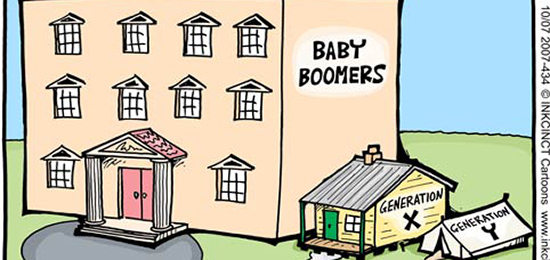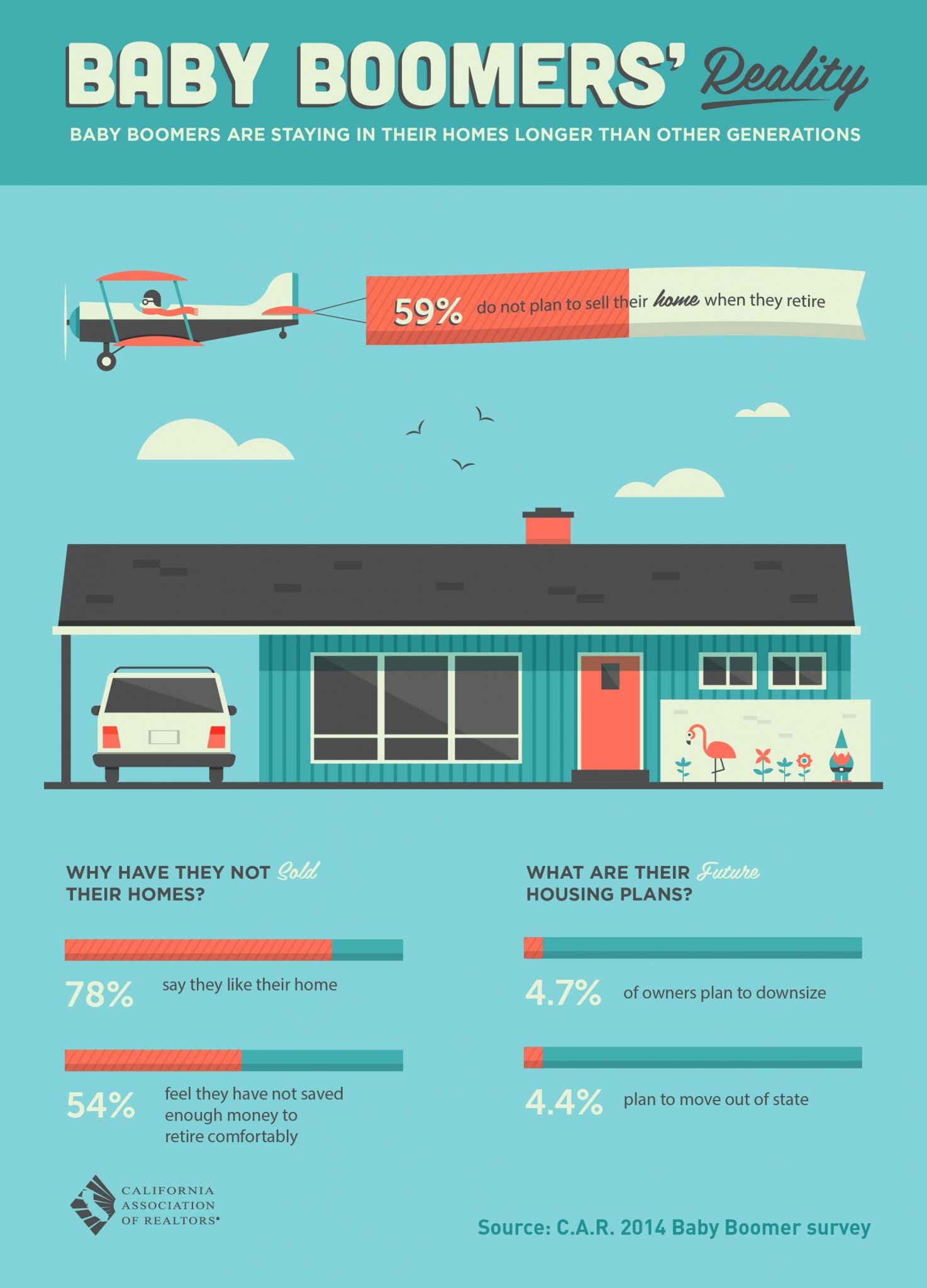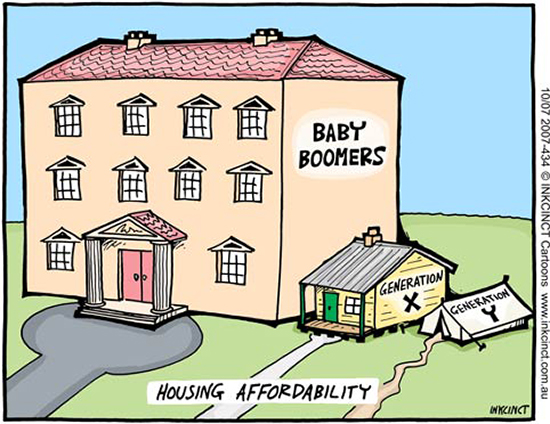
.
An article published by Vancouver Sun’s Kelly Sinoski talks about what we all know-finding an affordable detached home is pretty impossible. You have a handful of options including moving to the suburbs, buying a condo, or trying to find ground-oriented town or row houses.
The Urban Land Institute which does research on population and land-use states that in the 1990’s their studies indicated that Metro Vancouver would have a housing shortage “by 2021 unless it built 21,000 units annually-with 13,400 of those being ground-oriented,and 7,700 of them apartments”. The ULI was suggesting that for every apartment built, there needed to be 2 ground oriented townhouses or rowhouses.
Why? Because there was a common assumption that the baby boomers, those born between 1946 and 1964 would be downsizing into those row houses. Trouble is those boomers didn’t move from their single family houses, which may have been a good thing because ground oriented townhouses and rowhouses were never built in a ratio of 2 for every one apartment, and there is little stock.

Census Canada for 2011 information shows that between 2006 and 2011, Metro Vancouver added 38,340 ground oriented dwellings, and 35,870 apartment units. This is half the amount of housing that the ULI suggested. In five decades, ground-oriented dwellings have dropped from 85 per cent in 1961 to 60 per cent in 2011. While the laneway house has been another housing form that has been adopted, I have wondered whether better economies of scale and better pricing might happen if stacked townhouses and rowhouses were more ubiquitous.
How do we move forward for people who want to live in ground-oriented housing? With little ground-oriented townhouses and rowhouses in those west side neighbourhoods, its hard to convince those baby boomers to downsize from their single family castles to a more compact alternative. Is it too late to catch up?













My attempt at answering this question for Vancouver is here: http://thetyee.ca/Opinion/2014/10/20/Rising-House-Prices-Screwing-Millenials/
your article reads
“It is often pointed out that half of the residents of the City of Vancouver are renters, so homeownership should not be the goal, affordability should. … this disguises the fact that in previous generations the status of renter was, for many, a temporary not a permanent condition. Increasingly it looks as if renting is to be a permanent condition for middle-class Vancouver residents, at least for those who don’t leave the city.
May be a good starting point could be to agree on the above : The city made a wrong diagnostic which prevented to effectively address the home onwership issue (and eventually even introduced policies exacerbeting it, as illustrated in this recent post https://pricetags.wordpress.com/2016/05/17/teardown-no-good-intention-goes-unpunished/ )
I am consistently amazed how many seniors want to stay in their house, including my mother in law at age 85!
Another relevant article on the issue from Frances Bula in BC Business on Peak Millennial and why the Car continues to win the commuter mode share battle:
http://www.bcbusiness.ca/lifestyle/why-the-car-is-winning-the-commuter-war-and-what-can-be-done-to-stop-it
This is the best article I’ve yet to read from Frances.
I’m not at all surprised. Seniors, especially as they get into their mid 70s and 80s, need familiarity of people, places and activities.
I’m sure we all have our own statistics regarding the health outcomes of seniors who choose to stay at home or move. In my case there is a much higher incidence of physical and mental decline, and premature death amongst those who moved after the age of 70. That’s true for all moves whether they were to smaller houses, condos or assisted living facilities. The act of moving and not the destination seems to have been the trigger for the decline.
Nobody should be surprised at that; moving is a huge stress, even for young people, and it’s worse for seniors who often become confused when they are taken away from familiar surroundings and routines.
My parents are trying to maintain a house that’s way too big for them, but I cannot in good conscience suggest moving to a smaller place because the stress would be sure to take a toll on their quality of life. What I am instead trying to encourage is downsizing the contents of the house, reducing clutter and selling/donating or recycling items that are of no use to them.
Excellent points, David. Houses are homes, not just commodities.
One key action would be to allow one’s RS-zoned lot to be subdivided and sold to a family at a price well south of a full lot while maintaining one’s home position in one’s neighbourhood and creating a retirement fund. In sufficient numbers such a policy can increase the area’s family housing stock and repopulate the local schools.
It’s profoundly sad that the city doesn’t see it this way, and that the foreign ownership controversy gets all the press while being only a part of the story.
What did people expect to happen? Did people really think seniors were going to abandon the neighbourhoods they’d lived in for decades in order to live in a shoebox condo in Downtown or Metrotown?
Gardening is an enormously popular hobby for homeowners, but our big plan for when people retire and have infinite free time was apparently that people should downsize to condo towers where gardening is impossible/not allowed. Shocking that this didn’t go as expected.
Very true. I know of an elderly woman and experienced gardener that recently moved, partly because her strata corp told her to stop cleaning up the garden.
She could have moved into the building I’m now moving out of (because it only has 1br units) in the Oly. Village which has community garden space on the roof.
It’s certainly possible to design towers which allow green thumbs to be used … just not the norm.
Look at The Godfather – what did he do in his twilight years – gardening until he planted his own face. Think he would have moved to Yaletown, walking his Shitzu up and down the Seawall.
The expectation of retirement is obscene. We must fight against the dying of the light; share the wisdom of a life; be useful to the end. Be like the Amish. When we are truly used up let our corpses nourish the earth, not be interred. Leave a bench in memory, so that others may pause and reflect.
In a recent conversation with one of Vancouver’s most eminent and experienced urbanists and architects it was agreed that vast swaths of Vancouver need to be zoned for townhouses.
That’s why these, with garages, are selling like crazy in Surrey and Langley – often before built.
The buyers are locals. Absent a fast train to Surrey and Langley, modern road infrastructure is required. All politicians outside downtown realize this.
How about modern transit instead?
How about modern transit ALSO?
Sounds like bollocks – that you and this nameless “one of Vancouver’s most eminent and experienced urbanists and architects” decided “vast swaths of Vancouver need to be zoned for townhouses.” Architects would make a fortune.
If you and an engineer had a conversation, you’d decide you needed more freeways; or more bridges.
If you ran Translink you’d want more buses.
If you built towers you’d say everything should be zoned for towers.
If you were Trump, you’d want to raze some areas for a golf course.
Why don’t we turn golf courses – those bastions of privilege – into towers, or at least into three storey walk-ups.
How about those massive graveyards – why is some of the most prime real estate reserved for dead rich people. It brings down property values for blocks around.
Why don’t churches pay taxes? They have a lot of valuable property.
Stick that zoning along Point Grey Road, or in Shaughnessy – see what those folks have to say.
Architects do not “make a fortune” on their commissions. They make a living. And that living isn’t anything to write home about if you work below the equity partnership level, even in the largest corporate firms whose mass produced floorplans, stock facades, low remuneration for their technicians, and lack of attention to quality of design, context and social merit has gone far to industrialize a profession.
+1 … there would be some developers making good money on townhomes, but the archi’s wouldn’t be one of them. Quite simply, you can only design so much, and you can only charge so much, there isn’t much economies of scale unless you start doing the scaling (and building, and financing) yourself.
Perhaps Vancouver could use some of Pritzker Prize 2016 winner and Venice Biennale 2016 curator, Chilean, Alejandro Aravena does – he designs half houses. Owners pay for just half and fill in the rest when they can afford to.
There are plenty of models for that … Jean Nouvel’s Nemausus Housing being my favorite: https://www.youtube.com/watch?v=UtkF7sNKWRY
In Vancouver, the artist lofts near 4th and Main Street were built with this model too it seems … does anyone have some deets on those? I’ve always been curious, I know they were built because of a tax incentive, but why specifically the DIY finish model? (or just simply because the thinking was ‘they’re artists, they’ll want to change it anyway, so why bother finishing it?’)
-Ian
The one person I’d like to hear from on the housing issue is Michael Kluckner. He has an extraordinary spatial sensibility, and knows Vancouver as a parent knows their child. He is an elder that I trust.
The Pritzker is more about Starchitecture than the residential scale. I’m more impressed with the Aga Khan Award for Architecture – the Bridge School is an exemplar of what truly great architecture can do – and it cost little more than 100K.
Brian MacKay-Lyons is also worth studying – a proponent of the architecture of necessity – not granite gew gaws. And the early books of Duo Dickinson should be required reading for builders.
Locally, Earl Cunningham has built interesting residences on challenging lots. For a house to be ecological it must be desirable to live in for at least a century. The two suite basement dungeon spec houses with pretentious cladding in front are utterly unloveable. Many will be torn down after fifty years – after driving the owners crazy with water leakage.
Steve Mouzon has written well on the details of what to build. And everyone who cares about building is familiar with Christopher Alexander. But what we get are ugly houses thrown up by spec builders. Get the lot cheap. Throw it up. Sell it on. East Side or West, you walk on the floors of these code compliant ugly houses and they reverberate like an echo chamber.
Back when the Italians were building houses in Vancouver there was real workmanship. Now … People get excited about a renoe’d 70’s Van Special. Seriously?
In Norway, the state oil company has a philosopher on salary. The idea is to take the long view – the big picture. Maybe we could have something like that in the building realm. There are already restrictive covenants in areas like Grandview.
For sure, elitist golf courses should be turned into housing or parks. Golf courses are not part of our commons and could house tens of thousands. And Southlands, with its mega millionaire mansions and sprawling acreages – getting low taxes because they finagle a “farm status” – that’s just wrong. They grow next to nothing except their portfolios.
I like your comment about an ecological house being one that can be occupied for at least a century, but Metro Vancouver land economics simply don’t allow that to happen anymore.
In Vancouver many old houses have negative market value. Watch and you’ll see this happening all over the city:
1. An old house is put up for sale
2. It’s purchased by someone who gets a demolition permit and has it torn down.
3. The vacant lot goes back on the market for significantly more than it was bought for.
You may think only the City of Vancouver is home to tear downs, but you’d be wrong. The most extreme demolition I’ve ever seen is out in Delta.
The “old” house was built in 2010 making it only 5 years old when it was torn down. The explanation given to neighbours was that the previous builder hadn’t maximized the allowable floor area. The new house currently under construction is only a few inches bigger.
That someone could tear down a house worth more than the value of the lot and then replace it with something only a tiny bit bigger is proof that things have gotten completely out of control here.
One of the RISE competition entries actually suggested reoccupying the golf courses to house the inevitable climate refugees … interesting thought experiment.
So why is Langara golf course, for example, a property owned by the City of Vancouver not developed into 10,000+ homes, close to a subway to boot ?
You are not allowed to walk the grounds of the golf course!
There’s a DVD called: You’ve Been Trumped, documenting the Donald in Scotland – pushing to get a golf course built. He sucks up to the politicos; he cajoles; he browbeats. He is the role model for Donald Jr. Mini-Me, who runs around like a puffed up pit bull.
Ultimately, of course, he bullies. He uses bulldozers. He denigrates the charming properties around his dream golf course – similar to how the powermongers called Strathcona a slum when they were horny for freeways.
So, here’s the Vancouver housing crisis – and prime real estate vacant – but for wealthy wankers wanting to whack their balls into holes.
What should we call housing developments on these golf courses? Definitely nothing alluding to Yaletown. How about something golf related – historical. One of the develoments has to be called the Oka Crisis. Perfect. What’s the real crisis – a rich guy missing getting his ball into a hole – or housing.
To continue the theme, the other golf courses could be called the Ipperwash; the Gustafsen; and The Grand River. There’s no shortage of catchy names – don’t need Yaletown at all.
Author
Reblogged this on Sandy James Planner.